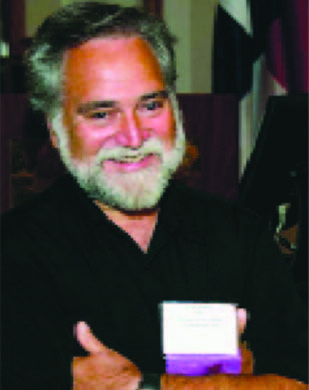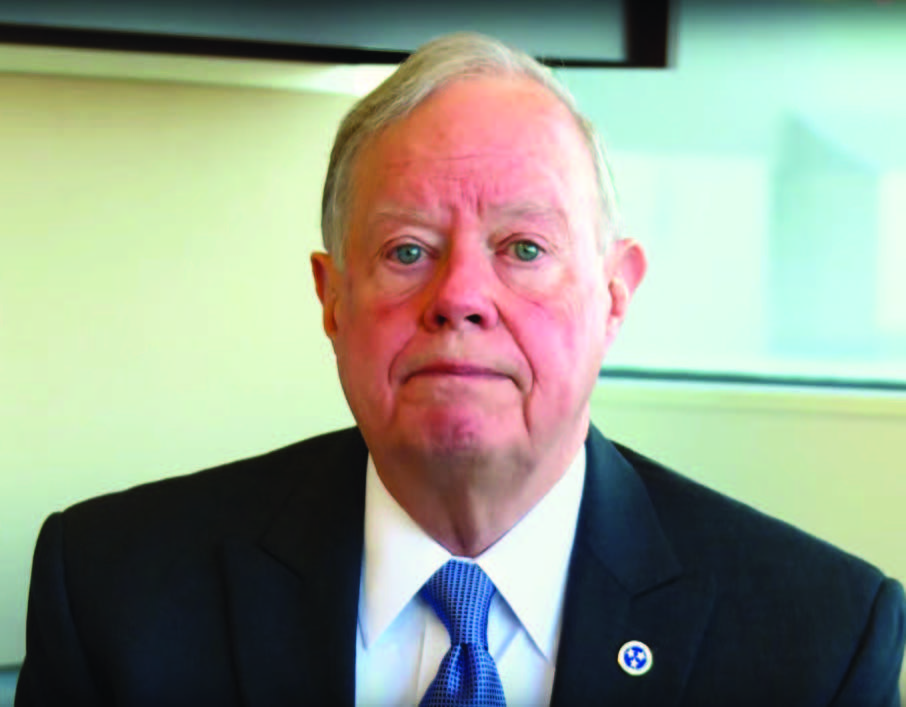RICK RADER, MD ■ EDITOR-IN-CHIEF
Tom Cheetham, MD
One of Tom's passions was "knowledge spread." He was instrumental in creating and disseminating the first clinical "guidelines" for primary care physicians. This was a comprehensive collection of clinical insights, protocols, procedures, milestones, "red flags" and benchmarks in the approach to patients with a variety of syndromes – Down syndrome, Fragile X, Prader-Willi, Smith-Magenis syndrome, and others.
In 1994 I was a newcomer to the field of intellectual and developmental disabilities. I had responded to a seductive ad in the Journal of the American Medical Association and became the Director of the Habilitation Center at Orange Grove in Chattanooga Tennessee. I was responsible for creating innovative programs in healthcare for patients with special needs. I was enthusiastic but quickly realized I knew nothing about this marginalized population and less about how to address healthcare disparities.
It quickly became apparent that I needed to immerse myself in the mainstream, learn the lingo and formulate a foundation to do some good. The first conference I attended was the annual meeting of the American Association of Mental Retardation (now the American Association on Intellectual and Developmental Disabilities). It was overwhelming. There were multiple tracks, workshops, committees, seminars and special interest groups. I found a break out session with a focus on nursing, healthcare and disparities… and bingo! After the lecture, there was a robust period of questions and answers. There was one individual who seemed to be asking the most interesting, provocative and challenging questions. He wanted to know "what I wanted to know," and that was, "why continue to do things that don't work?"
I knew I had to hitch my wagon to this guy. I knew I had to shadow him, befriend him and handcuff myself to him. He was going to be the solution to my problem of not knowing what I didn't know. This was Dr. Tom Cheetham, a Canadian family practice physician working in a large institution somewhere in the boonies of Ontario. Tom knew his stuff. He was a visionary, a clinician, and an advocate. We became friends, colleagues and disrupters for the next 24 years until his passing in 2018. I loved his story, his path and his journey. It was the stuff of movies.
He had aspiration beyond managing a group home. At that time, a new, innovative medical school was created. McMaster University threw out the traditional model of both medical education and the criteria of selecting medical students. While the candidates had to demonstrate that they had the intellectual "staying power" to make the grade (even though they didn't give grades) they didn't have to have the traditional "premed" background. Whatever it was they saw in Tom, they made the right decision and admitted him to the inaugural class. Tom Cheetham, House Manager, became Tom Cheetham, Medical Doctor. Tom's clinical acumen was coupled with the lessons he learned as a house manager and he emerged with the skills, insights, intuition and understanding that no other physician could be so equipped.
Over the next few years Tom and I collaborated on several projects involved in providing comprehensive community based medical care, medical education, biomarkers and advocacy.
One of Tom's passions was "knowledge spread." He was instrumental in creating and disseminating the first clinical "guidelines" for primary care physicians. This was a comprehensive collection of clinical insights, protocols, procedures, milestones, "red flags," and benchmarks in the approach to patients with a variety of syndromes – Down syndrome, Fragile X, Prader-Willi, SmithMagenis syndrome and others. The "Guidelines" formed the foundation of a clinical toolkit that would enable clinicians to provide comprehensive care, including disease prevention and wellness, to patients that had previously been rejected by community-based physicians.
Years later, I recruited Tom to become the Medical Director of our clinic at the Orange Grove Center in Chattanooga. While Tom was a respected leader in the field, as a Canadian trained physician, he was subject to sitting for and passing a barrage of exams required of all foreign-trained doctors. Rather than having Tom spend six months reviewing basic medical courses that he had taken 40 years ago, we were able to get him a rare exemption based on being able to identify him as having unique and rare skills and knowledge that would be of benefit to the United States. Obtaining one of these special visas was the equivalent of winning the lottery, but his credentials, reputation, skills and experience paved the way. He was granted an exemption by the United States Department of Homeland Security.
Tom spent several years raising the bar of medical care to our challenging patient population and created deep personal relationships with both the patients and the staff at Orange Grove. His Volvo with the Ontario license plates was often a lone figure in the parking lot after midnight. Tom was recruited back to Toronto to assist with the province's program of closing down the institutions. He was assigned to be the liaison between the primary care physicians and the Canadian medical authorities.
Following this challenge, he entered into the final phase of his career and assumed the position as the Assistant Commission for Health for the Tennessee Department of Intellectual and Developmental Disabilities. Over the several years he held this position, he became a champion for elevating the primary care for people with intellectual and developmental disabilities. He was appointed to the Vanderbilt University faculty where he contributed to the creation of the respected Vanderbilt University Toolkit for Primary Care Physicians. He continued in his commitment to train, inspire and encourage medical students to learn both the joys and challenges of caring for patients with complex healthcare needs.
For his efforts, accomplishments and tireless commitment, he was awarded the inaugural Spirit of the Surgeon General's Award by his friends and colleagues at the Academy Developmental Medicine and Dentistry.
Tom's loss is felt by everyone he touched over the years. His teaching, advocacy and initiatives will benefit the disability community for decades to come. For me, personally, he will always be that voice from the back of the lecture hall that announced to me that "here's this guy who would challenge the status quo, and could possibly get me going down that same road." Thanks, Tom.•
ANCORA IMPARO In his 87th year, the artist Michelangelo (1475 -1564) is believed to have said "Ancora imparo" (I am still learning). Hence, the name for my monthly observations and comments. — Rick Rader, MD, Editor-in-Chief, EP Magazine Director, Morton J. Kent Habilitation Center Orange Grove Center, Chattanooga, TN


A VISIONARY, A CLINICIAN, AND AN ADVOCATE: "We became friends, colleagues and disrupters for the next 24 years until his passing in 2018. I loved his story, his path and his journey. It was the stuff of movies."